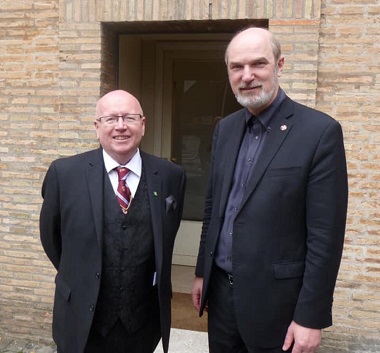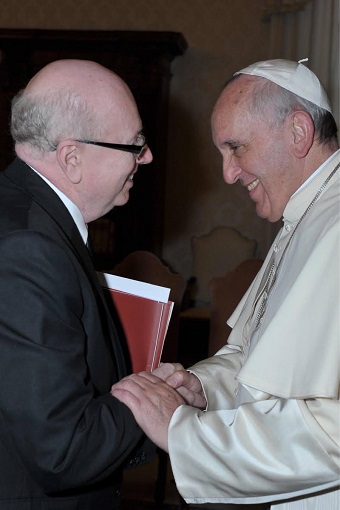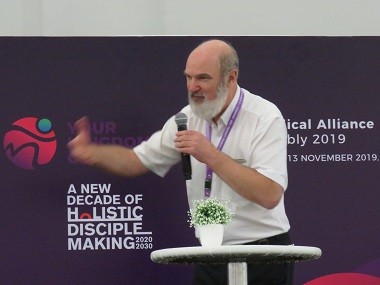
Former Secretary General of the WEA Geoff Tunnicliffe (left) believes Thomas Schirrmacher is an “excellent choice” as the new leader.
Thomas Schirrmacher will take over leadership of the World Evangelical Alliance (WEA) next March from Bishop Efraim Tendero, who in turn succeeded Geoff Tunnicliffe, who lives in Metro Vancouver.
Following is the first part of a November 5 interview from Christian Today, in which Schirrmacher reflects on Tunnicliffe’s role in strengthening the WEA.
CT: You have been involved in the WEA since the 1990s. How do you think the organization has evolved or grown since that time?
Thomas: When I first got involved with the WEA, I thought it was like a huge store that has nothing in the front window! You may walk by and not think there is very much to it but the more you go inside, you discover it is actually the second largest religious organization in the world.
Former Secretary General Geoff Tunnicliffe was the first one to really grasp this and try to change perceptions of the WEA. At that time, we put the numbers to him, that while the Vatican was by far the biggest church group, the evangelicals and the WEA were actually the second largest global Christian organization – bigger even than the World Council of Churches.
Of course, when we are speaking about spiritual matters, how big we are is not our concern. But when we are engaging with the media and politics, that is very different; size does matter and I felt this was something we should be sharing with the world because often at that time, the evangelicals had a tendency to feel like the victims. We needed to turn that impression of themselves around because when we look at the numbers, it’s not true.
Other areas where I can see positive development is in our dialogue with other religious groups. Many years ago, there was a lot of noise when the WEA’s Religious Liberty Commission visited the Dalai Lama to raise concerns about the persecution of evangelicals by the Buddhists in Sri Lanka.
At that time, we said, if we want to speak about the persecution of evangelicals by Buddhists, who else should we speak to? The Dalai Lama actually wrote to the Buddhists in Sri Lanka telling them to stop persecuting Christians, and that was very encouraging for us.
Since then, there has been a change in the mindset of evangelicals. They know now that such engagement is not going against evangelism and I was always very strong on that point because the reality is that most of the Christians who are persecuted are new Christians.
And so we cannot simply evangelize people and then when they become Christian and are threatened, we turn around and say to them ‘we can’t help you, we only do evangelism.’ No, if Christians are being persecuted, then we need to be there with them too.
There was similar resistance when we started dialoguing with Muslims and even the Vatican. Now the majority of evangelicals not only accept this engagement, but accept that it is not going against evangelism. In fact, it is a form of evangelism because we are engaging with people who will never mix with the ordinary people on the street.

Geoff Tunnicliffe meeting with Pope Francis in 2014.
CT: It’s been a challenge sometimes in the history of the WEA to unite all of the different national alliances. Would you say it is a more cohesive organization now?
Thomas: That was the task that Geoff actually gave to me when he was Secretary General because he wisely said that evangelicals are theology-driven and we won’t get more unity by defending ourselves.
It will only come through the Bible and through theology. So we have invested a lot in that, starting with the Theological Commission (TC).
At that time, Geoff told us he wanted the TC to be very close to him and to counsel him. He wanted to be sure that what we do and say as the WEA is in line with the different regions that we serve and in line with the national alliances.
One of our first major pieces of work was a document that we prepared jointly with the World Council of Churches and the Vatican on Christian witness to a multi-religious world – a code of conduct for evangelism.
I remember Geoff saying to me that if this went wrong and the national alliances got angry with us, we might have to look for new jobs! When it came to publishing the document, I spoke with every national alliance about the text and they all agreed to it.
That was a big achievement because there are some alliances that, if it were up to them, would not want us to have anything to do with the Vatican. But I have always said that I do not want the cardinals and the Pope to read what our position is in the newspapers. They should hear it from us.
And later on, the Vatican Synod invited Geoff to speak to them on evangelism from an evangelical perspective. I told WEA members at that time that this was evangelism. Telling a room full of 200 to 300 cardinals and bishops what evangelism is is a good hour for evangelism! It is not compromising.
I think that investing in this broad theological discussion with all of the regions and national alliances paid off and now, when we speak on certain issues, our voice as the WEA has become much more confident and it is much clearer that we are speaking as the WEA and that speaking out is what Jesus would want us to do, that it doesn’t mean we are getting unduly mixed up in politics.
Go here for the full interview.

Thomas Schirrmacher teaching at the WEA General Assembly in November 2019.
When I emailed Geoff Tunnicliffe for the picture (above) of him and Thomas Schirrmacher, he added this note:
I believe Thomas is an excellent choice. He is not only a brilliant theologian, ethicist and philosopher, he is a man of deep compassion for the the impoverished and persecuted.
He has vast experience in dealing with the complex issues we face in the world. In addition, he is deeply committed to Christian unity and kingdom collaboration.
Tunnicliffe is involved with several media and technology projects, some of which are listed on his Wilberforce Global website. He lives in White Rock.
I was fortunate enough to have a chance to chat with Thomas Schirrmacher at the WEA General Assembly last November. Here is what I wrote about him in one of my articles:
Over the years, I have observed the work of Thomas Schirrmacher, from afar, with some admiration. He has several doctoral degrees, is director of the International Institute for Religious Freedom, has written and edited 102 books, etc (go here for his ‘short’ biography).
Wedding evangelical enthusiasm with considerable learning, he has tackled many issues where most fellow evangelicals might fear to tread.
Thus it was enjoyable to hear him in person during a workshop on ‘Holistic Disciple Making and Inter-religious and Interfaith Conversations.’ He urged confidence in our faith, saying:
Dialogue and witness and mission not only can go together, they should go together. . . .
Evangelicals are such a huge religious body that people will know about us anyway. Who best to tell them, us or the media?
As an example of working outside our comfort zone, he described meeting with the Grand Mufti of Pakistan – not a natural ally for evangelicals, but one who was able to, and did, prevent anti-Christian rioting.
I wrote several articles about the WEA General Assembly and its significance:
